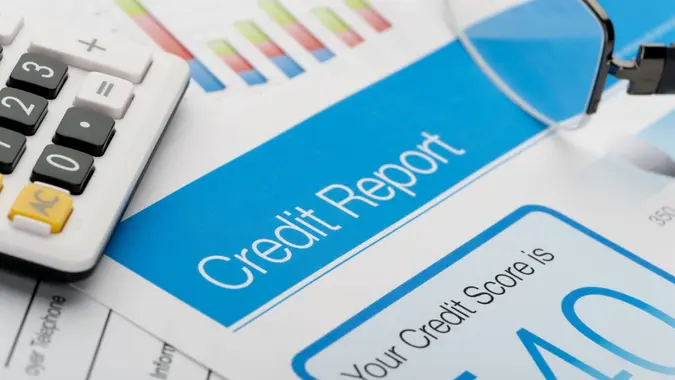3 Underrated Credit Store Boosters That Actually Work

Commitment to Our Readers
GOBankingRates' editorial team is committed to bringing you unbiased reviews and information. We use data-driven methodologies to evaluate financial products and services - our reviews and ratings are not influenced by advertisers. You can read more about our editorial guidelines and our products and services review methodology.

20 Years
Helping You Live Richer

Reviewed
by Experts

Trusted by
Millions of Readers
Most people already know the basics of credit score maintenance — pay on time, keep balances low and avoid opening too many new accounts. Those staples matter.
But there are lesser-known ways to give your credit score a boost, and they’re worth considering if you’re looking to raise your score. Erin Confortini, a financial influencer and co-host of “The Life You Love” podcast, shared some of these underdiscussed tactics with GOBankingRates as part of our Top 100 Money Experts series.
Here are Confortini’s three credit-boosting moves that don’t get as much attention — but can make a big difference.
Report On-Time Rent Payments to Credit Bureaus
If there’s one expense you’ve prioritized, it’s your rent. Yet your years of punctual payments aren’t showing up on your credit report, because most landlords don’t report on-time rent to credit bureaus.
Given that rent is likely your largest monthly expense — more so than your car loan or credit card payments, which lenders do report — not having your on-time rent counted seems like a missed opportunity. Confortini certainly thinks so.
“Start reporting your on-time rent and utility payments to the credit bureaus,” she said. “There are providers that can set this up for you so your on-time payments can help your score.”
You, as an individual, generally cannot report rent directly to Experian, Equifax or TransUnion; you must use a third-party service or have your landlord report it for you. As you evaluate vendors, watch out for fees and make sure the provider reports to all three bureaus — not just one or two.
Become an Authorized User on Someone Else’s Card — but Only If Their Account Is Exemplary
Becoming an authorized user on a family member’s or friend’s credit card can be a fast way to establish or improve credit — provided the primary account is in good standing. As an authorized user, the account’s payment history and credit limit can appear on your credit report, which may help your score.
“If someone you trust has a strong payment history and low utilization, ask if they’ll add you as an authorized user,” Confortini said. “But have a clear conversation about expectations, spending limits and repayment so the arrangement doesn’t damage either person’s credit.”
Remember: the primary cardholder is on the hook for paying the bill. If the account falls into delinquency, your credit could be hurt alongside theirs. Only pursue this option with someone whose habits you trust.
Ask for a Credit Limit Increase
Confortini offers another almost counterintuitive way to boost your credit score:
“Ask your credit card company for a credit limit increase. This can reduce your credit utilization ratio without altering your spending habits.”
Here’s how it works: If your credit limit increases but your spending stays the same, the percentage of available credit you’re using falls. That’s a win for your credit utilization rate — an important factor in your score. Ask your issuer whether the request will trigger a hard credit inquiry; if it will, factor that into your decision too.
But remember, a higher credit limit is not permission to spend more. The goal is to look more responsible with credit — not to rack up more debt.
More Tried-and-True Tips
While Confortini is eager to share lesser-known strategies, she also stresses the importance of familiar, foundational advice. These time-tested methods, combined with new ones, can help you build a credit score you’re proud of.
Stop Using a Card if You Carry a Balance
Confortini is clear on this point: “If you’re carrying a balance in credit card debt, it’s super important to stop using the card and only use your debit card until you pay off your debt.”
Continuing to charge to a card with a balance usually increases the amount of interest you owe and slows repayment.
Consistently Pay On Time
On-time payments are the backbone of a strong credit score. Missing even one payment can cause damage.
“Always set up autopay for the entire statement balance (or at an absolute minimum, the minimum payment) to avoid missing a payment,” Confortini said. “If you do miss a payment, contact your credit card company and ask if it can be resolved.”
Round Up To Pay Down Debt
This method is exactly what it sounds like: If your monthly payment is $90, why not round it up to $100? The extra $10 reduces your principal while cutting into the total interest over time. Confortini was involved in building an app called Ditch that automates roundups and applies them to debt.
“Ditch lets you round up all of your purchases and apply those roundups straight to your debt,” she explained.
Track Your Spending
Tracking your spending is a classic piece of financial advice for a reason. It reveals where your money goes so you’re better equipped to build a realistic budget and stay on track with your financial goals — including building a strong credit score. For Confortini, disciplined tracking was also the key to paying off her own debt.
“I paid very close attention to where my money was going so I could have money left over at the end of the month to pay off my debt,” she said.
This article is part of GOBankingRates’ Top 100 Money Experts series, where we spotlight expert answers to the biggest financial questions Americans are asking. Have a question of your own? Share it on our hub — and you’ll be entered for a chance to win $500.
 Written by
Written by  Edited by
Edited by  Money Expert
Money Expert 









































































































